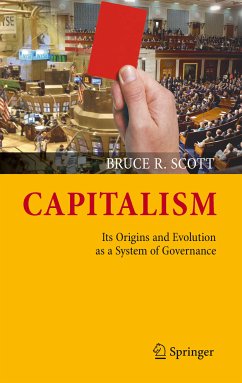Two systems of governance, capitalism and democracy, prevail in the world today. Operating in partly overlapping domains, these systems influence and transform each other, but the nature of this interaction is often misunderstood -- largely because capitalism has not been recognized as a system of governance. Rejecting the simple definition "capitalism = actions of firms in markets," Harvard's Bruce R. Scott offers instead a conception of capitalism as a three-level system akin to organized sports, in which games (markets) are conducted according to rules administered by referees (regulators), which in turn are shaped and directed by sports' governing bodies (political authorities).
Tracing the evolution of capitalism from a variety of perspectives, Scott shows how governance has always been key to the system. Historically, capitalism was not a natural outgrowth of trade; it could not have emerged without political authorization for the creation of markets for land, labor, and capital. Urgently needing funds for military defense, regimes ceded some power to a new class of economic actors, spelling out their rights and responsibilities with corporate charters. The United States Constitution was anomalous in reserving to individual states the power to grant such charters, with the result that states compete to offer firms the least regulation. The Constitution also gave exceptional powers to the Supreme Court, which has interpreted the Constitution as mandating laissez-faire policies.
It is impossible to adequately understand capitalism without understanding the role played by governance. This book challenges the notion of a "universal" model of capitalism, particularly one based on the US system, and illuminates the broader frameworks upon which markets depend.
Tracing the evolution of capitalism from a variety of perspectives, Scott shows how governance has always been key to the system. Historically, capitalism was not a natural outgrowth of trade; it could not have emerged without political authorization for the creation of markets for land, labor, and capital. Urgently needing funds for military defense, regimes ceded some power to a new class of economic actors, spelling out their rights and responsibilities with corporate charters. The United States Constitution was anomalous in reserving to individual states the power to grant such charters, with the result that states compete to offer firms the least regulation. The Constitution also gave exceptional powers to the Supreme Court, which has interpreted the Constitution as mandating laissez-faire policies.
It is impossible to adequately understand capitalism without understanding the role played by governance. This book challenges the notion of a "universal" model of capitalism, particularly one based on the US system, and illuminates the broader frameworks upon which markets depend.
Dieser Download kann aus rechtlichen Gründen nur mit Rechnungsadresse in A, B, BG, CY, CZ, D, DK, EW, E, FIN, F, GR, HR, H, IRL, I, LT, L, LR, M, NL, PL, P, R, S, SLO, SK ausgeliefert werden.
Professor Scott presents the development of capitalism as a political process, the result of conflicts among social actors, with capitalists and government officials as the main actors. While focused on the United States, this book has the great merit of showing that American capitalism was a contingent and not inevitable outcome, and that different balances of forces and different circumstances created distinct varieties of capitalism in other countries and historical moments. This book's insights deserve careful consideration from historians, social scientists, and all those who address economic issues in the political realm.
Richard Lachmann,
Professor of Sociology
College of Arts and Sciences
University at Albany
Richard Lachmann,
Professor of Sociology
College of Arts and Sciences
University at Albany
"Professor Scott presents the development of capitalism as a political process, the result of conflicts among social actors, with capitalists and government officials as the main actors. While focused on the United States, this book has the great merit of showing that American capitalism was a contingent and not inevitable outcome, and that different balances of forces and different circumstances created distinct varieties of capitalism in other countries and historical moments. This book's insights deserve careful consideration from historians, social scientists, and all those who address economic issues in the political realm." -- Richard Lachmann,Professor of Sociology, College of Arts and Sciences, University at Albany









